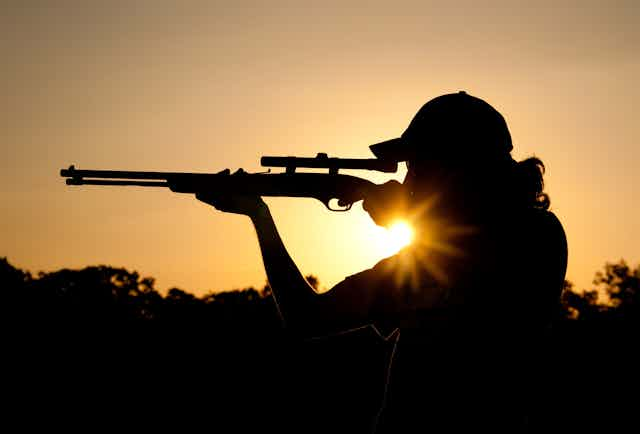Police forces are cracking down on gun owners in the wake of heightened concerns over terrorism. Some lawyers are now claiming that the police are even revoking legal firearm owners’ licences and guns because of a new array of “indicators” which show a lack of suitability to own them. These include spent convictions, depression, domestic disputes and discord and even neighbour conflicts.
The caricature of the nosy neighbour has been a staple of many a popular sitcom, from Australia’s Neighbours to the UK’s Ever Decreasing Circles and One Foot in the Grave. Even when neighbourly relations turn sour, they continue to entertain. But the question is whether we should be criminalising legal gun-owners and outsourcing the job of the police to the neighbourhood watch?
Crowdsourced policing is not new. Cybercrime vigilantes have been helping the police solve crime for some time. See, for example, the case of the British woman who put a live cat in a wheelie bin. In this case outraged online communities rallied to help identify her and bring her to justice. But does this suit gun control?

UK firearm regulations are considered by many to be the strongest in the world and shooting incidents are rare. So is it fair to remove a legal owner’s shotgun if they undergo a divorce, experience a period of depression, or have a fractious relationship with their neighbour? One recent neighbour boundary dispute escalated to the degree that one legal gun owner had had their weapons confiscated and subsequently returned.
In the UK, there are over one million shotgun certificate holders. The UK application process is managed at local Constabulary level (not nationally) via an application that includes references and a home visit.
In contrast to US cultural expectations – where the number of guns owned by civilians is between 270m and 310m – in the UK there is no right to ownership. The onus is on the application process to demonstrate an “unsuitability” for possessing firearms. This might be, for instance, a criminal record. An unsuccessful application or revocation of a certificate can be appealed at the local crown court.
My own research has revealed that sport shooting is elitist and self-regulating. But the present policy emphasis is on public safety. The scrutiny of the UK’s present system stresses the point of certification. This shift in the police’s attitude towards the revocation or removal of firearms where neighbour disputes are reported has caused alarm in the shooting press. But is public safety proportionately enhanced by this policy?
The digital landscape
As a sociologist researching rural change and society, this issue demonstrates how the digital era has not streamlined our regulatory framework – quite the opposite. Game shooting is contentious and strongly opposed by some. What has been debated and what has now shifted is the role of surveillance, post-certification. This has already been extended to include markers on owners’ medical records and theoretically allows around 40,000 NHS staff members access to the knowledge they are a gun owner.
Plans to create an anonymous hotline where the public may report concerns about firearm owners were scrapped following protest from the pro-shooting community. However, the recent actions of the police have returned the onus to the public. Even minor reports of disputes have resulted in gun owners having their firearms removed from their possession (to be stored elsewhere) and/or their licences revoked. These include where planning disputes arise between neighbours and relationship breakdowns. In response, two major shooting organisations have extended their insurance coverage to include the court costs involved with appealing such police decisions.
Shotgun owners are both urban and rural residents. The rural gun owner faces having to travel a considerable distance to their nearest authorised firearms dealer where their guns may have been stored because of a neighbour dispute. This would make it impossible to perform activities linked to ownership (such as pest control). Furthermore, shooting for some is not only recreational, but also linked with their profession, such as gamekeeping.
The issue of proportionality is key. The legislation focuses on public safety and delivering value-for-money to the public. Firearms policing has actually become risk-averse, following errors by several constabularies which resulted in deaths. Tragic mass shootings cannot be anticipated but the police are failing to implement Home Office recommendations designed to update and standardised the application system. So this new move by the police to effectively outsource their scrutiny of certificate holders is not justified by the present legislation. It is reactive policing, giving the illusion of action and service delivery while holding consequences for what remains a legal activity.
It also bypasses the opportunities of the digital era. While some rural policing can be effectively crowdsourced, such as appealing for information via police Twitter feeds, the burden of proof for misuse or handling of firearms in the field is unlikely to be achieved for a self-regulated activity. By contrast, boundary disputes, noise complaints and unruly hedges are common neighbour conflicts and can disproportionately affect gun owners.
This current improvised policy by the police is failing because it is not asking questions about what is a safe, sustainable, environmentally and ecologically-balanced and socially-acceptable approach to sport shooting.

